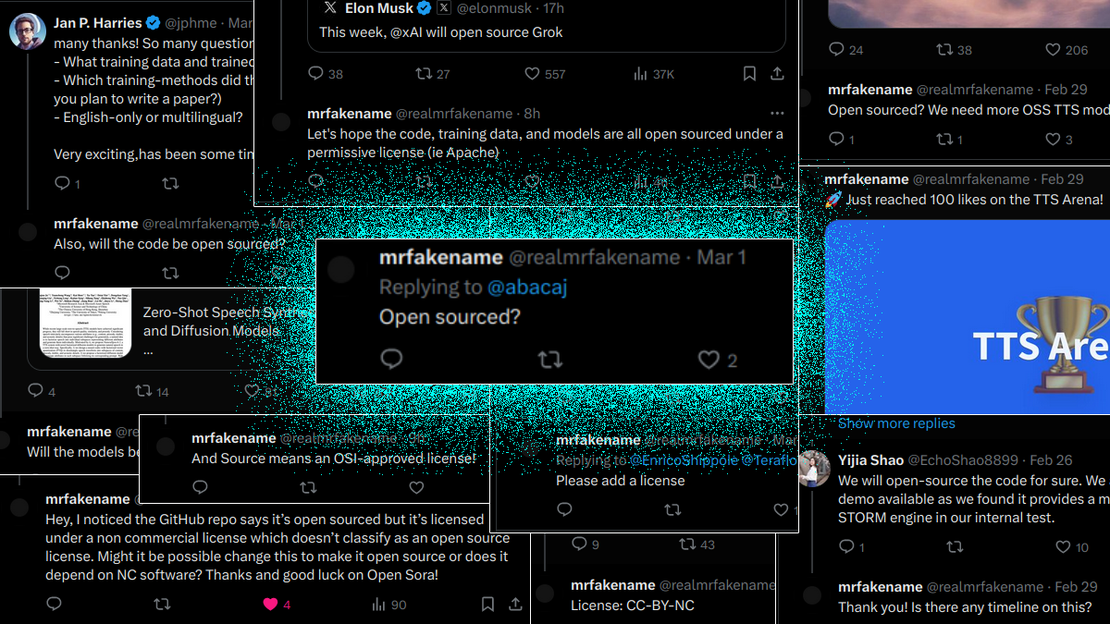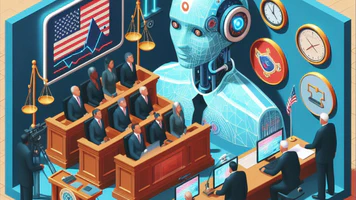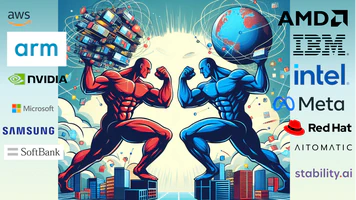
Open Source Whisperer, Unmasking the Champion of Open Source AI: MrFakeName
- Justin Riddiough
- March 11, 2024
In the enigmatic world of Open Source AI, a new hero has emerged from the digital shadows. Operating under the moniker MrFakeName, this champion has become a beacon of transparency and accessibility, pushing the boundaries of what it means to democratize artificial intelligence.
Humble Beginnings
Our story begins on January 9th, 2024. MrFakeName, ever the vigilant observer, set his sights on Nous Research, a rising star in the AI firmament. His inquiries focused on their datasets, hinting at a deeper motivation – a desire for openness within the often-opaque world of proprietary AI.
This initial foray was just the first ripple in a wave of advocacy. MrFakeName became a constant presence, a digital gadfly gently nudging developers towards open-source practices. His focus? Two key areas: Text-to-Speech (TTS) and the ever-evolving realm of Large Language Models (LLMs).

A keen eye for detail and a deep understanding of the technical landscape are MrFakeName’s hallmarks. He meticulously tracks the progress of organizations like Hugging Face, highlighting their open-source initiatives. He holds developers accountable, calling out those who misuse the term “open source” while attaching restrictive licenses. A recent Twitter exchange with Bria_ai exemplifies this. MrFakeName politely but firmly challenged the characterization of their model as “open-source” due to its non-commercial clause.
Hi @bria_ai_! Congrats on your launch - the model looks super cool! I noticed on your demo it says it can be used for non-commercial purposes only, pretty sure that doesn't qualify as "open sourced." Would you mind a) not classifying it as open sourced or b) changing the license?
— mrfakename (@realmrfakename) February 7, 2024
Theories abound regarding MrFakeName’s true identity. Could it be Elon Musk, the maverick billionaire who recently advocated for OpenAI to embrace open-source principles? Or maybe, just maybe, it’s simply someone fed up with the loose interpretation of “open source” within the AI community.
The TTS Arena
But words takes a backseat to action with MrFakeName’s latest project: The TTS Arena . Inspired by LMSys’s Chatbot Arena, this innovative platform allows users to compare and contrast the outputs of different TTS models, fostering a spirit of friendly competition and ultimately accelerating advancements in the field. The Arena’s open-access nature, featuring models like Pheme and MetaVoice alongside the proprietary ElevenLabs, underscores MrFakeName’s unwavering commitment to transparency.
Today, I’m thrilled to release a project I’ve been working on for the past couple weeks in collaboration with Hugging Face: the TTS Arena.https://t.co/Mu76ux0q9Y
— mrfakename (@realmrfakename) February 24, 2024
A Hero in the Shadows
As MrFakeName continues his quiet crusade, one thing is certain: the world of Open Source AI is a brighter, more accessible place thanks to his tireless efforts. He is a testament to the power of a single voice, a reminder that even in the digital shadows, heroes can emerge, nudging us all towards a more open and collaborative future of artificial intelligence.
You can follow MrFakeName on Twitter and Hugging Face .
AI Models reached out to MrFakeName for comment, however we have yet to receive a response. It seems that the enigmatic champion prefers to let his actions speak for themselves.
Follow AI Models on Google News
An easy & free way to support AI Models is to follow our google news feed! More followers will help us reach a wider audience!
Google News: AI Models

